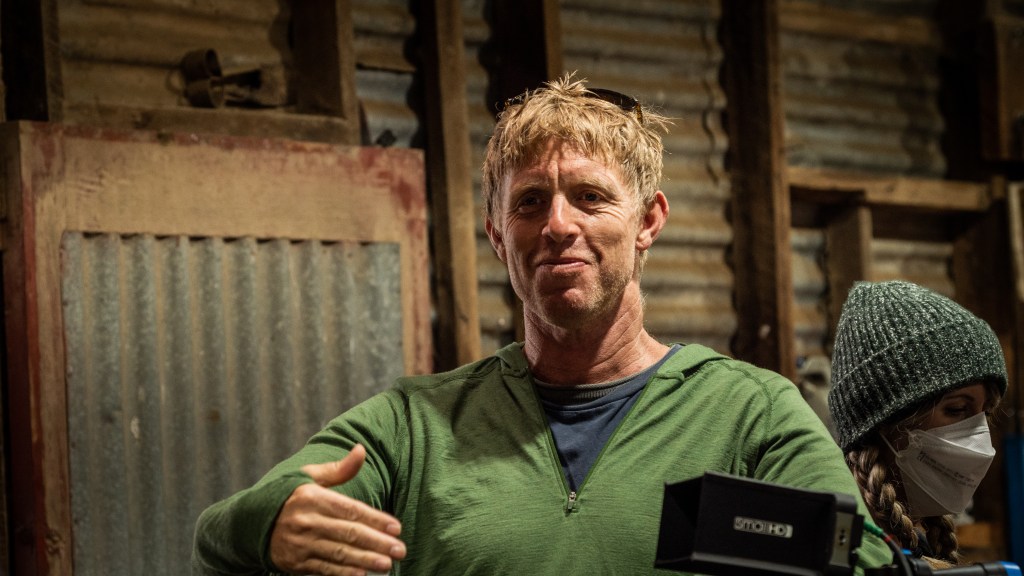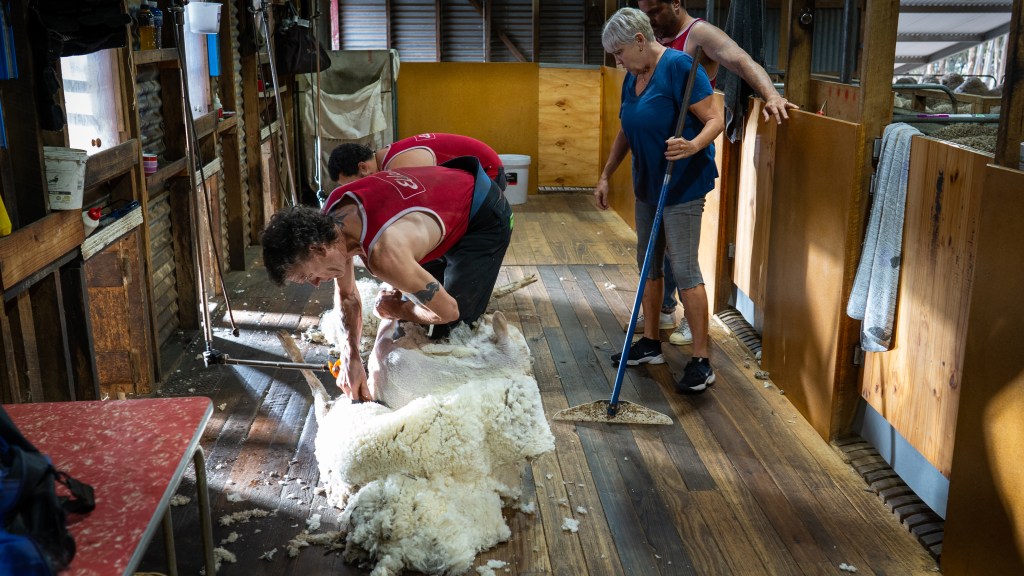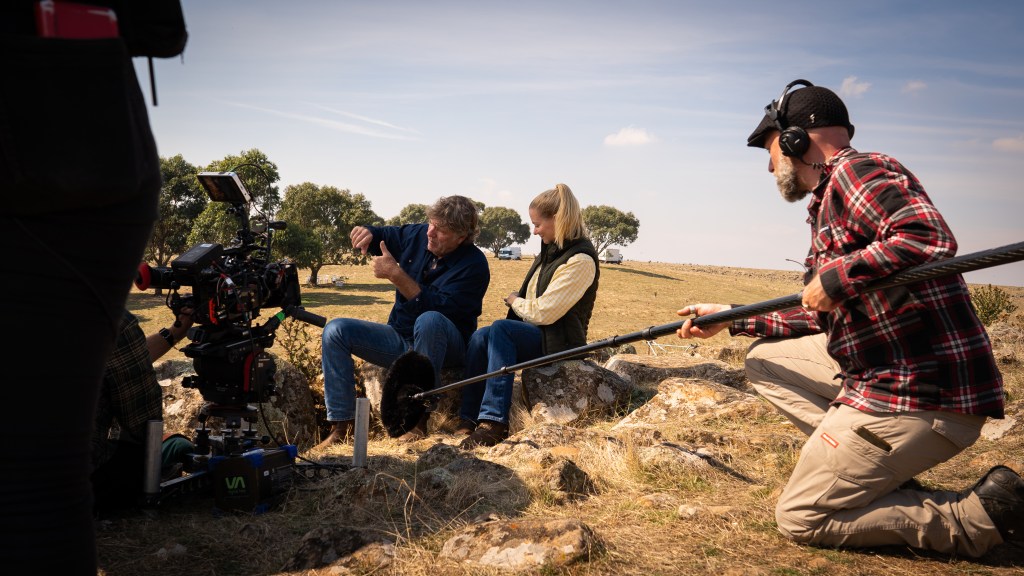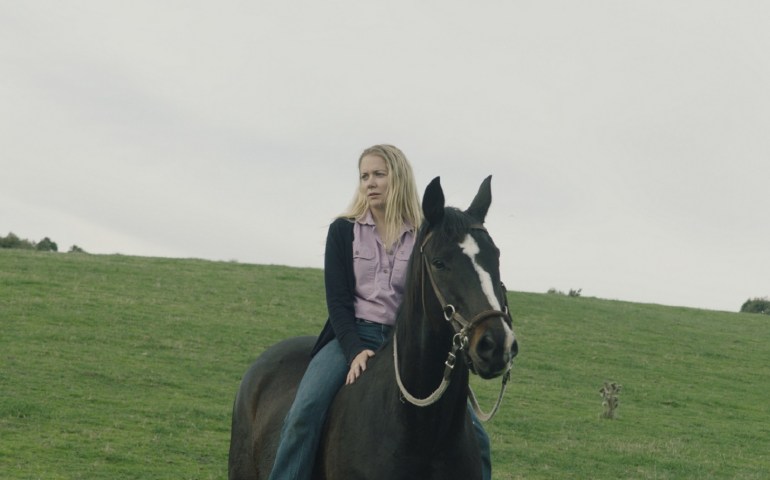When Leila McDougall decided to make a film focused on rural mental health just prior to COVID, it was her experience as both a farmer and a teacher that guided the message she wanted to convey and the form it took.
“Creating a documentary about farmer health wasn’t going to work because I know, as a teacher, if you say to kids, ‘Do you want to watch a documentary or movie?’, they’re going to go movie,” she said.
“You think, ‘Okay, what’s the best way to try and implement this message through a movie?’, so that’s when I started writing and interviewing people, as well as researching the stages of grief and putting it all together.”
More than three years later, the finishing touches are being applied to Just A Farmer, a narrative drama she wrote, produced, and starred in.
As central character Alison, McDougall plays a newly widowed mother-of-two that is also left with the care of an alcoholic father-in-law and a failing farm, after her hard-working husband Alec (Joel Jackson) suddenly dies. Alison is forced to reckon with the reasons for her husband’s death while trying to forge a new path for her family, all while struggling to pick up the pieces of her life.
Directed by Simon Lyndon and produced through Vam Paddock Productions, Just A Farmer also features performances from Robert Taylor, Damian Walshe-Howling, Susan Prior, Louise Siversen, Trevor Jamieson, and Eddie Baroo.

Production took place predominantly at McDougall and her husband Sean’s Tatyoon property in Victoria’s west earlier this year with a creative team that included executive producer Shaun Miller, producer Ahalya Maharaj, cinematographer Gavin John-Head, editor Ashlee Lukas, line producer Rachael Morrow, production designer Verity Adams, hair and make-up artist Georgia Baird, and sound engineer Bruce Armstrong.
McDougall, who founded rural and remote health charitable organisation Live Rural with her husband in 2014, said she was inspired to tell the story after growing up in rural Australia and seeing “older men turning to alcohol and suppressing their feelings”, while also witnessing the state of mental health in the community she now lives in.
“The conversation has definitely improved over the last 10 years, but it’s still not great,” she said.
“I don’t want my kids to grow up in a world where they can’t talk about their mental health and they’re expected to behave and act in a certain way just because they’re farmers. I really want to create a better and healthier environment for them.”
According to the Centre for Rural and Remote Mental Health, people living in rural and remote Australia are up to twice as likely to die by suicide as people living in major cities. A separate study conducted through National Rural Health Alliance based on 10 years of national coronial data between 2009 and 2018 also found that one farmer dies by suicide every 10 days.

It was these statistics, along with the real-life experience within the script that resonated with Maharaj, who met McDougall at an acting training class about two years ago.
The producer said she had a “visceral reaction” to the subject matter.
“Firstly, it’s pretty inspirational for someone to write a script and be so courageous in doing so,” she said.
“Also, it was [McDougall] living the life; it was such an authentic script that it was really about making sure I could help to get this made.”
Lyndon had similar intentions when he heard about the story while on the set of a proof-of-concept short with McDougall last year.
Known for his appearances across Chopper, Miss Fisher’s Murder Mysteries, Puberty Blues, Mr Inbetween, and Troppo, he initially boarded Just A Farmer in an undefined capacity, giving feedback on the script before eventually being asked to helm the project in what is feature directorial debut.
“It just felt right,” Lyndon said.
“It’s a big thing to take on, not just for myself but in not wanting to let Leila and Ahalya down – can we do this in such a way that it manages to break through and serve its purpose? The answer was a resounding yes.”
Lyndon would go on to reside on McDougall’s property in the months leading up to the shoot in order to get a sense of what life was like on a farm.
The surrounding community also played its part in contributing to the accuracy of the rural setting, with everyone from shearers to some of the writer’s horse-owning friends coming in extras while others dropped off food, or supplied various machinery.

Maharaj said the privately-funded production, which had a budget of about $1.9 million, provided the first on-set experience for a number of people behind-the-scenes.
“We’ve all got to start somewhere, so it was just having faith in people to do their jobs,” she said.
“At times it got messy – I understand the term herding cats now – but we screened them to make sure they were on board for the right reasons and they all had their own personal connections to the story, which made them more dedicated to the project.”
Maharaj is in talks with distributors regarding a theatrical release of Just A Farmer, which the team is eyeing before the end of the year.
A fine-cut screening was held last Saturday, giving the opportunity for people to provide feedback that will potentially be incorporated into the final edit.
Of the initial response, McDougall said the film had given “people the bravery to see themselves in the characters, and that it’s normal to feel these feelings”.
“I went out for dinner with a friend that watched it afterward, and this guy never speaks about his emotions,” she said.
“He’s a police officer and I asked in my research what’s it like when you come across someone that’s died by suicide and he just locked up and said, ‘Nah, not talking about it’.
“On Saturday night, I couldn’t shut him up. He was telling us everything about what he’s been going through and that’s exactly what this film needs to do.”
Lifeline: 13 11 14 www.lifeline.org.au
Beyondblue support service line: 1300 22 46 36



